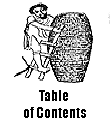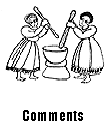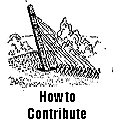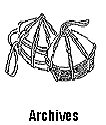

LeQso
By Yeshi Medhin "M'ts! M'Ts!" Melancholy, in a non-syllabic non-word. It rang out in the adarash immediately following the lull of the horrific wails that would rise up out of nowhere and then subside into muffled wails. It was my first leQso, and as much as I was shocked by the seemingly unprovoked jags of crying the women indulged in, I was more so by the laughter and chatter that followed. I watched them, my own countrywomen, as though I had suddenly morphed into one of those anthropology Ph.D.s that often tried to tell me that they knew more about my people and my culture than I did. In that single hour of loud crying, feedings and chatter, I began to realize that maybe, just maybe, those braless, former flower-children did know just a tad more about me and mine than I did myself. I sat in stony silence, my eyes skimming the faces in the room. Some wore a haggard expression and frequently pressed tattered tissue to their trembling lips. Others whispered and giggled, while others still could be heard laughing as though they hadn't a care in the world. The people in the room were comprised largely of women. The men, I'd noticed as I'd walked in following my mother's lead, haunted the hallways, smoking, drinking, and eyeing the ladies as they walked in. Not too different from your average Ethiopian nightclub scene, only this time, plaintive wailings rode the air instead of the rhythmic strains of music. I tried to cry. I really did, but I was too overcome by the newness of the event, and how artificial it all seemed, after all. I couldn't for the life of me figure out how it was that these women could burst into tears so spontaneously, the turn around and begin social chatter with their neighbor. It all seemed a little surreal to my untrained eyes, and I felt a little jaded. Somewhat besmirched by what I'd always assumed was a solemn affair. It had turned into a farce right before my eyes. Could those trained anthropologists who roamed my land in their open-toed Birkenstocks, their khaki shorts and their wide-brimmed straw hats, could they have picked out the subtleties or would they have been so into the moment that they would have missed it all and captured nothing in black and white from the winking shutters of their camera's expensive eye. Women came around bearing trays of lukewarm drinks. I took a Styrofoam cup of Coke. It turned out to be Pepsi so I made to set it down on the floor, but then at the last minute, decided to hang onto it and role it between my hands to give myself something to do in the interminable hour we had to stay there to show proper respect. Next, they brought around a tray of Abesha dabo and I wondered idly if the square block I picked out were cut from the dabo my grandmother had baked. The first time my family had come to pay their respects, they had come empty handed, as was custom. The second time, we'd brought a case of good beer, and a large bread baked in a turkey roaster. It was bad luck, I was told, to take anything back to your home from a leQso bEt. Back home, you'd have had to leave your shoes outside your doors, lest you'd inadvertently tracked Death back with you on the soles of your feet. I guess, it would make sense that Death would be sneaky enough to stick to the bottom of your shoe where you'd never look to find it. Did my annoying little anthropologists scoff when they had "discovered" that? Under my folding chair, I swung my feet back until only my toes touched the floor and dared death to stick himself to my soles. The daughter of the woman who had passed away from an undisclosed illness while in Agher bEt sat front and center, her hair cropped short, the black Tbeb of her neTela forming a sad halo around her drawn face. I stole glances at her and decided right there and then that when it was my turn to mourn my mother, I would do it in private…not in this public display of graphic grief where I would feel obligated to cry with each new mourner. I knew that more and more of my generation in the Diaspora were choosing not to meqemeT when it was their turn. We didn't know, or had forgotten, how to be public with our grief. Or maybe, just maybe, we were too embarrassed to shed the veneers we'd soldered onto our Ethiopian facades in the crucible of Western assimilation - or - horrors of horrors - the veneers had been there so long they had replaced our Ethiopian facades permanently. The dry bread stuck in my throat at that thought and I forced some Pepsi in and washed the morsel down my pallet, thinking on some other, disconnected level, that this dry tasteless bread couldn't possibly be a product of my grandmother's exquisite moya. We thought that we'd timed our stay just long enough to be kind and brief enough to miss dinner. But by the time my nostrils were flaring in even rhythm to the rumblings in my stomach, it was too late to make the getaway before dinner. It was only 5:30, too early, I'd assumed, for dinner, but then again, what the hell did I know!? I took the proffered Styrofoam plate and nodded my head briefly in thanks. I took a roll of injera but added one more at the young woman's gentle chiding: "EndE, CHemiri'nji! isuma aibeQam." Then I ladled out aliCHa w'T, gomen and ye timatim selaTa and partook in this ritual feeling as uncomfortable as a ferenj might in a Tej bEt for the first time. The meal was over, the dirty plates and napkins removed and drinks were being served to the new comers when suddenly a wave of silence rolled across the Adarash. I followed everyone's covert gaze to the entrance and saw a retinue of women in black making their way in. I didn't recognize them and they meant little to me, but from somewhere behind me, I heard the fiercely whispered, "Afer dimE tibla! Demo sew neN bila izih timTa?" I turned and caught the acid expression in the woman's eyes, then watched with silent fascination, as that expression was wiped clean from her face. I thought for a minute, that the Pepsi I'd kept imbibing was making me hear and see things. Other women in the room exchanged looks, shot whichever woman it was in the new retinue, one of their venomous gilmiCHa and then just as quickly hid their hate behind facile smiles. The women came forward and one by one, threw their arms around the main mourner and wailed away in unrestrained anguish. One of them threw her palms up to the ceiling and screamed, "Ai, Ai, Ai, Aiyeeeeee!" I felt the tears that wouldn't come earlier climb up into my throat and settle there in a lump. The room picked up the rhythm of her cries and in easy syncopation wailed away with the new comer who looked fit to tear her bodice off and beat upon her bared chest. I felt my own tears climb all the way up into my eyes then squeeze out onto my cheek in one long hot trail. Thankful that I could finally cry for this dead woman whom I'd never met, I bent my head and willed more tears to leak out. She was someone's mother, I told myself, and felt the tears gush out. She was a young woman once, I thought, and felt the tears fall and splash my hands. I put my feet flat down on the floor, to ward off sneaky Death, I acknowledged to myself, and let my shoulders shake the tears out of the gripping constriction in my chest. There! I thought in singular satisfaction. No anthropologist, no matter how "native" she may have gone, would ever be able to conjure up the emotions that this woman's unrestrained wailings had invoked from my soul. My Western veneer apparently needed only a few drops of hot salty tears to begin to crack and peal. I looked up proudly, at last a part of this mass grieving and began to let myself understand, without explanation, that this was a necessary ritual. Suddenly, the ferenj adage, "Misery loves company," made perfect sense to me, and I smiled through my tears. Comprehension was bliss. Belonging was Nirvana. In the elevator up to the street level, my mother looked at me and said, "Anchim aleQesh?" I smild at her shyly, suddenly embarrassed. That ferenj veneer hadn't melted completely off, not yet….not ever, maybe…,but only cracked a little. "I couldn't help it," I said. "That woman who came in just before we left…Wow!" I said, unable to put into words something my mind didn't wholly comprehend. "Isuwa?" My mother said and I looked up at her at the unmistakable sneer in her voice. "TaQiatalesh…?" she began then stopped as the elevator doors opened and we were replaced by more Ethiopians wearing black. In my car, I raised the subject again. "Did you hear what that woman behind us said when those women came in?" I asked. "Yes," my mother replied. "You'd think," I said, feeling the weight of new maturity grace my shoulders like a mantle, "that people would leave their petty personal differences at the door when they come to a leqso bEt." My mother glanced at me and let out a short, mirthless laugh. "Inante hedachihu neber…," she began and told me a tale that still makes me shudder in revulsion…but exactly at what or whom, I'm still not sure. One of the women in that group, the one, apparently, who had wailed the loudest and made my reluctant tears rise to the occasion, had been a cadre in the Dergue during Qei shibirr. She was, as apparently most of those women knew, single-handedly responsible for the execution of ten children out of one household. The weTatoch, ages ranging from as young as thirteen to as old as twenty-five or -six, had been suspected of sympathizing with the student uprising. She was the liQemember of her QebelE and had summarily removed the young suspects from the crazed, desperate clutches of their mother and had them taken to a place from which they never came back. The following week, the mother was told to come and collect the rEsa of her children. Shortly thereafter, the mother suffered a nervous breakdown and could be heard, sometimes, calling out to her dead children to come and eat or to perform some household chore. I listened in silence, the bile rising to the back of my throat faster than my tears had, my hands wrapped around the steering wheel in a death grip. I couldn't imagine, I could NOT imagine silently sitting there, knowing what I knew and allowing this woman, this animal into normal society. What were we if we could simply turn the other cheek to an atrocity like that, and accept a person like that back into our midst? What did that say about us? What she had done, what that made her, that was pretty clear. But what did it make us? I asked my mother, "Did they know? Did the women who cried with her, did they know what she had done?" My mother said, "Everyone knew…afer dimE tibla!" "But how could they…?" I began out loud then stopped myself. How could she? How could she show her face in civil society again? What was she that she could do what she had done then waltz into the middle of a leQso and cry for the dead when she was Death herself? What were we that we'd allow it? My thoughts tumbled all over each other. I thought of that broken mother who called out to her dead children and how every time we looked at the woman who had killed all her children, how every time we allowed that known murderess in our midst, how every time we allowed ourselves to breath the same air she breathed…. I thought how that was such a betrayal of that mother of ten. What would my hated anthropologists make of that? Would they have found some societal more that would allow for something like that to take place? Would they excuse the "gentle natives" and call us "noble savages?" Would we qualify? <<TaQialesh ye abesha yiluNta::>> My mother said, breaking into my splintered crazy thoughts. Do I? I thought. Do I really? And I bit my tongue and slid my shock behind my Western veneer and tried to pretend that I knew. Then I shook my head in negation and I said, <<Hulu neger wesen allew::>> <<M'Ts!>> she said, <<Isus awon::>> |

|

|

|

|

|
| © Copyright SELEDA Ethiopia, April 2001. All Rights Reserved. |